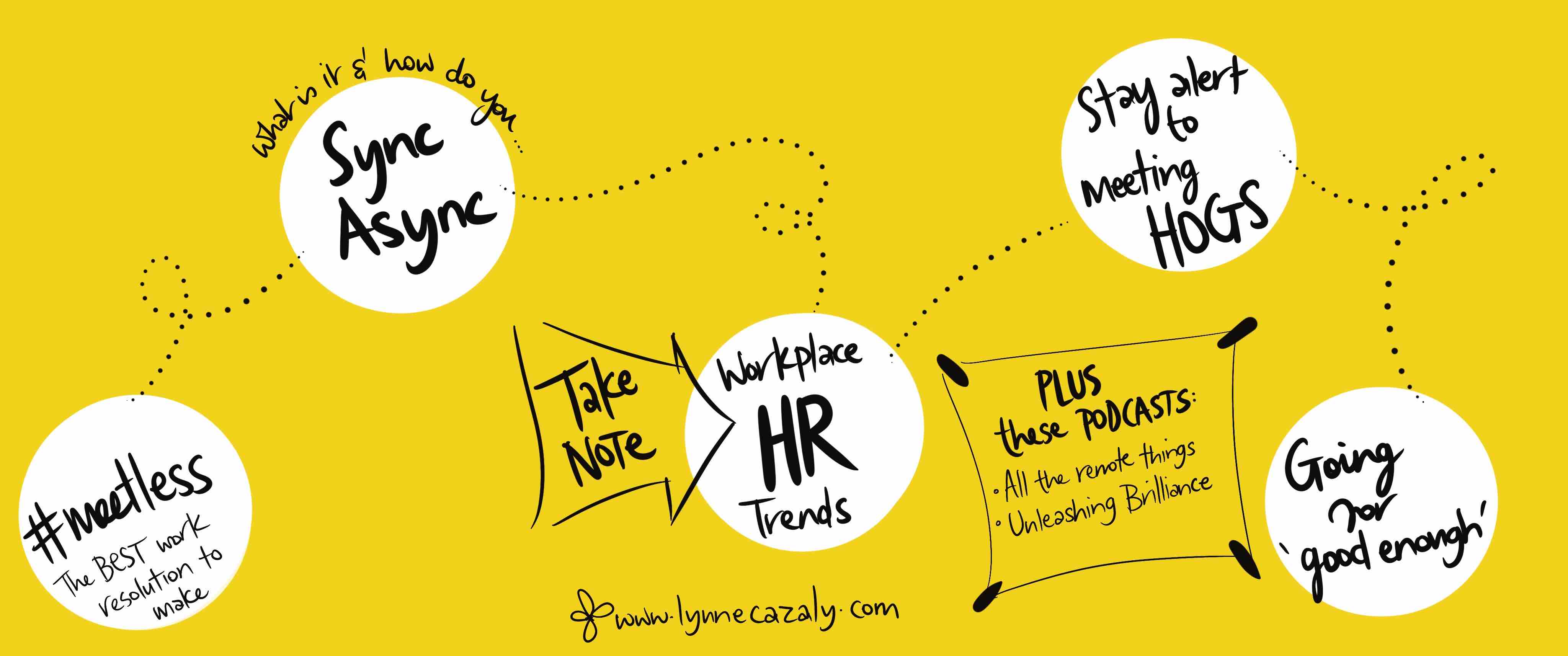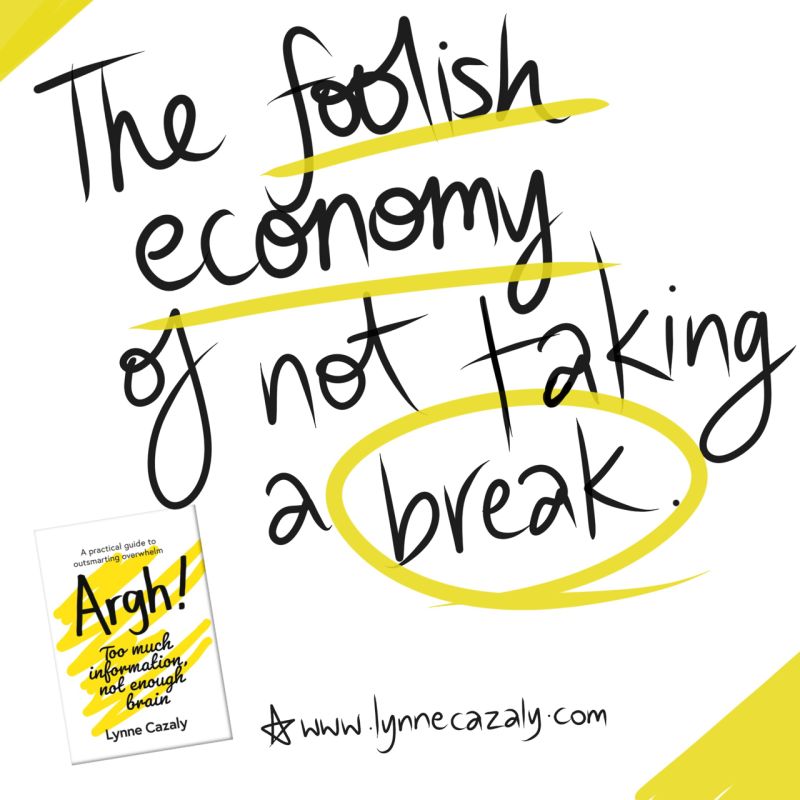How to #meetless/Asynchronous Work/Workplace HR Trends/Watch for meeting hogs/Going for good enough
 Saturday, January 21, 2023 at 11:18AM
Saturday, January 21, 2023 at 11:18AM 
The best work resolution to make …
If you’re going to make a resolution about work this year, let it be this:
Resolve to reduce your work meetings this year.
Meet less. Way less.
Tally up last year’s meetings if you need to work out what ‘less’ would mean. And make sure it’s less by a lot.
Being at the request of so many meeting invites weighs heavily on our time, attention and energy.
And the drain is exaggerated when the things we want and need to do remain undone and incomplete. Exhaustion quickly returns after a day of back-to-back meetings with barely a break. And they are mostly dull, disengaging experiences that don’t facilitate active participation and contribution.
Yes, many meetings could have been an email. Or not held at all. Or for this resolution … not attended at all.
It could have been a chat message or a shared document or a first draft shared for comments.
💥Resolve, vow and promise to decline invites more than you ever have before.
💥Resolve to hold your nerve if you feel guilty about it or are shamed in to attending because a colleague wants you there … pleeeeese.
💥And see this instead, as progressing towards more modern work.
It is modern work that uses less dated and wasteful tools for control and communication, and uses more open tools for collaboration and contribution.
Delete the time and energy drain that is the ‘have you got a moment’ or ‘it will only take a few mins’ or ‘can you just come to this meeting’.
I’ll share more in the coming weeks on how to bring this resolution to practical reality.
Meet = sync Meet less = async
Here’s how to start achieving a #meetless resolution this year:
⬇️ DECREASE the amount of SYNCHRONOUS work you do with others : these are the meetings, quick chats, interviews, conversations where you all have to be there at the same time
and …
⬆️ INCREASE the amount of ASYNCHRONOUS work you do with others : this is work you do at times and in ways that suit you, like contribute to shared documents and files, have uninterrupted work time, use chat and messaging, email and video.
Asynchronous ways of working provide HUGE flexibility, allowing people to contribute and work in ways and times that suit them.
Asynchronous work can become more inclusive, more considerate and allow people more time to think and contribute … rather than the control, theatre and waste of an ‘everybody-now-meeting’.
Save synchronous meetings for the times that really, truly matter and that absolutely need to be done with others, all at the same time.
Yes, you still have meetings but stop meeting as the default action to progress work.
It’s vital to learn and understand more about how to work asynchronously.
It’s the best way to reduce pressure, stress and overwhelm and increase progress, wellbeing and engagement.
Want to learn more…?
Get ‘Sync Async : Making progress easier in the changing world of work’ — for the tools, techniques and ways to help you #meetless and achieve the outcomes and results you’re aiming for.
It’s available as an ebook and paperback wherever you get your books.
Make #meetless something you’ll do this year - as a leader, manager, colleague and friend.
Workplace HR Trends
It’s a great time to read about foresight and what we think might evolve or occur in workplaces and spaces.
Review and consider how you’ll approach the year, what priorities and plans could be impacted and how you’ll evolve strategies, styles and your approach to work.
The insights for Human Resources trends include things like:
. Wellbeing
. Skills-based hiring
. Flexibility
. Hybrid working and hybrid learning
. Reporting
. Office redesign
. Blended workforce
. Burnout
SNORT : Meeting hogs are on notice
There’s a perfect environment that meeting hogs love to create, and you need to be alert to it.
Here are 4 signs a meeting hog is in the area :
🐽They call lots of meetings
🐽They invite lots of people
🐽They drone on for too long
🐽They don’t let many people speak, participate or contribute.
The meeting hog’s work life revolves around all talk and no work.
Meeting hogs love taking people away from their work activities and holding and controlling them like an audience at a performance. But the ‘show’ is a bad one. Stay alert! Keep an eye out for the meeting hog.
They’ll be:
🐽getting ready with committees and working groups
🐽suggesting regular status updates
🐽scheduling weekly check-ins
🐽setting up fortnightly rhythms and meeting cycles
and
🐽sending out recurring appointments.
But stay strong.
This year aim to #meetless - for your own well-being, productivity, impact and motivation.
I’ll share techniques to make this strong and positive change in your work life. Tackling and responding to the meeting hog is one of the key strategies you’ll need.
Meetings are becoming old ways of working. Sure, not all meetings, but many … most of them. And meeting hogs love to argue for the importance of their meetings.
Hold an intention to #meetless - First, stay alert to meeting hogs.
The good/bad trait to shift this year
If there’s a mindset you’d like to shift in 2023 … consider understanding and finding a replacement for perfectionism.
This good/bad trait that’s often shared in job interviews when we’re asked about our weaknesses, isn’t worth the effort it drains from us.
There’s no connection between perfectionism and high performance. *gulp*
And perfectionism can actually be behind anxiety, depression, overwork, rework, stress, and other issues we suffer from.
The antidote, solution or alternative is going for good enough. But how do you do that?
‘ish:The problem with our pursuit for perfection and the life-changing practice of good enough’ shares the research, stories, stats, steps and insight on how to think and work in ways that don’t require perfect anything.
There are other, better ways to think and work.
This award-winning book is available in paperback, audio and e-book - wherever you get your books. Have you read it yet ... or listened to it?
It’s been recommended by many people who have experienced the significant shift it presents. If you’re up for it, it’s an easy read and listen.
All the remote things Podcast
It was a pleasure to join a recent podcast episode of ‘All the Remote Things’ with Tony Ponton.
We talked through different concepts, ideas and thinking, plus a little about my background in communications and agile ways of working. I shared some tips on better ways of working!
Watch or listen to the full episode here.
Unleashing Brilliance Podcast
And more podcastness right here with Janine Garner's Unleashing Brilliance. It was so great to have a conversation about imperfection, new ways of thinking and working, creativity and collaboration. Thanks Janine!




















